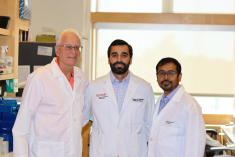Rutgers Cancer Institute researchers tap university's microbiome expert to study microbes
Investigators from Rutgers Cancer Institute of New Jersey, together with RWJBarnabas Health, examined the microbiome of pancreatic tumors and identified particular microorganisms that are associated with inflammation and poor survival.
According to the researchers, these microorganisms may be new targets for earlier diagnosis or treatment of pancreatic cancer, the fourth leading cause of cancer death for both men and women in the United States. The findings are published in the online version of Cancer Cell.

We have more microbes - organisms too small to be seen with the human eye - living in our body than the total number of human cells. They can even be found in organs such as the pancreas, which at one time was considered microbe-free.
Subhajyoti De, principal investigator at Rutgers Cancer Institute and senior author of the study along with graduate student Bassel Ghaddar, began exploring whether there are microbes residing in pancreatic tumors and if they have consequences for cancer progression or treatment. Studying microbes in tumors is difficult, however, partly because every patient is different and microbial footprints are too subtle to detect reliably.
To explore further, the researchers teamed up with Martin Blaser, the Henry Rutgers Chair of the Human Microbiome at Rutgers and world-renowned microbiome expert. The investigators developed a genomic approach called single-cell analysis of host-microbiome interactions (SAHMI) to identify microorganisms associated with individual human cells. Sifting through millions of RNA sequences using sophisticated software, the researchers identified which ones likely represent human genes and which ones are microbial in origin.
"This new technique allowed us to identify tumor-associated microbes and measure the activity of the host cells at the same time, which is a significant technical advance," said De, who is an associate professor of cancer systems biology at Rutgers Robert Wood Johnson Medical School.
The results were stunning: Studying two independent groups of pancreatic tumors, the team found that some had bacteria that associated with specific cell-types within the tumor, which were essentially absent in normal pancreatic tissues. These bacteria were predominantly located within tumor cells - and their abundance correlated with cancer-related cell activities. The specific signatures of the microbes that were found predicted particularly aggressive cancer progression and poor prognosis.
The microbial footprints within the pancreatic tumors raised the question of whether the immune cells that were present were responding to the cancer or to the microbes. The study's findings suggested the immune responses were mostly responding to the microbes in the tumor and not to the cancer cells.
"Our observations provide a new view about why pancreatic cancers are so difficult to treat," said Blaser, who is also a research member at the Rutgers Cancer Institute and a professor of epidemiology and biostatistics at the Rutgers School of Public Health. "But better understanding these interactions may identify new approaches for therapies."
Other researchers involved in the study include: Antara Biswas, the Center for Systems and Computational Biology, the Rutgers Cancer Institute; Chris Harris, Department of Surgery, the University of Rochester Medical Center; M. Bishr Omary, Center for Advanced Biotechnology and Medicine at Rutgers; and Darren R. Carpizo, Department of Surgery, the University of Rochester Medical Center.
The Rutgers Cancer Institute of New Jersey is the state's leading cancer center and only National Cancer Institute-designated comprehensive cancer center.






